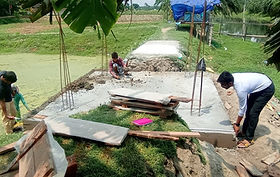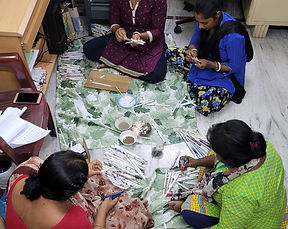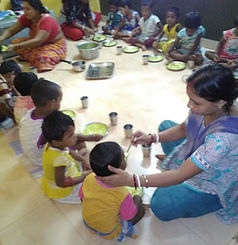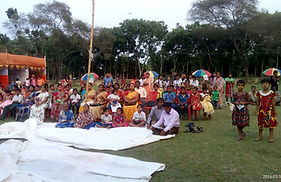
KOLKATA TRUST FOR HUMAN DEVELOPMENT
PROJECTS
Kolkata Trust for Human Development (KTfHD) had started working with the target group of children under a structured plan for intervening into respective families, engineering changes in respective communities and securing the changes as permanent social behaviour. The various projects undertaken by the Trust overs the years are given below.
Integrated Learning Development for Selected Children (ILD) Project
Good education is one of the key components for children from socially and economically disadvantaged families to improve their living status. Till the age of six years old, it is the formative age for a child and crucial for their mental and physical development. Thus, gaps in learning during this life phase leads to weak foundation for education in higher grades, resulting in children lagging behind school curriculum and ultimately dropping out of school as they are not able to cope with the grade-wise curriculum. To overcome learning gaps of children it is very common to pay for tuition classes after school. If families fail to organize tuition classes in primary or high school for their children due to financial constraints or limited awareness and priorities, these children will fail in their educational development and usually drop-out of school in early teenage years. Based on the available data and initial visits this scenario is also prevalent in the proposed project area of Diamond Harbor, 24 Parganas (South).
To overcome these challenges and to offer the children an education support which will help them in future, Kolkata Trust for Human Development (KTfHD) has initiated a short-term project called “Integrated Learning Development for selected children (ILD)” (March’24 to December’24) to overcome educational learning gaps of 500 selected children (between age 4-14years) by following a child-friendly integrated pedagogical learning concept focusing in 4 Gram Panchayats of the Diamond Harbor, namely Khorda GP, Vadura Haridas GP, Mathur GP and Kalitala GP.
The project aims to set up and run 12 Bridge Centers in selected villages to support approx. 500 children of socially and economically disadvantaged families to increase their learning levels as per their age wise competencies. In addition, the project aims to increase the awareness about reading and learning and about child protection and age-wise developmental skill (sensory, cognitive, behavioral etc.) for children in the communities focusing on parents, siblings, youths and other community members. Through the involvement of other relevant governmental institutions, like ICDS and schools, and governmental departments the project will have a bigger outreach in the 4 Gram Panchayats.
Climate Smart and Sustainable Water Resources(CSSWR) for Vulnerable Communities Project
From the year 1996, a unique town twinning partnership was initiated between Herrsching Municipality, Germany, and Chatra Gram Panchayat, Baduria Block, North 24 Parganas, India with the active support and assistance from the development NGO Indienhilfe e.V. Herrsching, Germany (IH). Kolkata Trust for Human Development (KTfHD) has been actively supporting this “Town Twinning” initiative through its capacity and understanding since its inception.
Problems related with arsenic groundwater contamination were evident in Chatra since the beginning of the town twinning partnership. To help mitigate this problem, IH, together with adelphi research gGmbH, initiated the Safe Drinking Water Project (SDWP) in 2016 which was supported by various organisations in the course of the project (e.g Gemeinde Herrsching, AWA Ammersee, Hijli INSPIRATION, Jadavpur University, Technical University of Munich etc.). A long-term goal of providing access to safe, arsenic free and affordable drinking water by implementing of community-based sustainable water supply in the region is being addressed with a first pilot plant for approximately 150 households. The implementation was initiated in the location of Rasui Paruipara where cluster of minority and socially backward communities were identified in December 2020 who had serious need for safe drinking water. After the identification of suitable land with available perennial surface water sources, the construction work started in March, 2021 and completed on June 2022. The plant has finally been commissioned from 16th June, 2022 and is running successfully since then.
The water for the plant is currently sourced from an adjacent pond which has the option to be connected to the adjoining perennial river Padma. Due to serious contamination of the adjoining river and the pond (which is used as reservoir for the drinking water plant) and threats of extreme weather events and climate change, there is a high risk that the management and maintenance of the drinking water plant will be too expensive for the local community. Therefore, the project CSSWR funded by Indienhilfe e.V. Herrsching, Germany, aims to reliably protect this important pond, which is under threat through extreme weather events and climate change. In order to ensure reliable performance of the entire treatment system, the protection of the pond is absolutely necessary to prevent external contaminants from catchment area of pond infiltrating the pond thereby polluting the drinking water resource. The climate smart protection of the pond needs to be done in two ways: firstly, the construction of an intake structure between the perennial river Padma and pond; and secondly heightening of the pond bunds and fencing of the pond itself.

Project pond at Rasui Paruipara

Construction work underway

Construction of Intake gravel structure
Green Pen – Use and Grow
It is a unique concept owned by KTfHD, which has two benefits: i.e- environment friendly in terms of replacing an essential plastic material of daily life; women empowerment through small scale income generation.
Green Pen is made with used papers like old newspapers, magazines, torn books etc. It is a “Plantable pen”, it has good quality of seeds inside mixed with excellent vermi-compost and sealed by the soil (a tight mixture made with glue and soil) from outside. Thus, after use, it can be planted and vegetables or nice flowers, can be grown.
Not only does this pen reduce the use of plastic, unlike other pens available in the market which are “use and throw”, it also reduces energy cost and water wastage involved in re-cycling of paper as it re-uses old paper for making it. It is highly durable pen (will not break for being made of paper) and ensures smooth writing. The pen is being made by women from nearby slum areas of Kolkata Trust for Human Development (KTfHD) in Kolkata under the leadership of Ms. Shibani Das, who has been a long-term promising employee of KTfHD. The concept is developed by one of our Trustees Ms. Rusha Mitra. The cost of each pen is Rs 10 (ball point pen) and Rs 15 (gel pen). The women involved in the making of these pens are being paid Rs. 2-3 per pen, thus leading to their income generation. The “Green Pen” initiative is a stepping-stone for promoting Green and Sustainable environment to ensure a quality life for our beloved children.
The use of Green Pen will create awareness amongst our next generation and sow the seeds of love and responsibility towards nature and environment from their young age. Thus, we request you to use and promote this Green Pen –Use & Grow an alternative, to give a Chance for a sustainable Change to life!

Green Pens

Community members making green pens
Initiatives taken during Covid times
With the lockdown imposed in India from end of March 2020, to combat the coronavirus situation, millions of people were not able to work. With no livelihood and income source, they are left with no money to buy food and other basic necessities. Hunger and starvation have emerged as major threats to communities living on the fringes.
Various initiatives were taken by Kolkata Trust for Human Development (KTfHD) to provide the necessary dry ration in form of puffed rice, biscuit, eggs, rice, potato,soyabean etc. to the neediest families of Anandapur, Madurdaha locality (75 families) and Khalpara slums (9 families) of Kolkata get the necessary dry ration in the form of rice, dal(pulses), soyabean and biscuit.










Both the location of the distribution was finalised based on the assessment and as recommended by the Board of Trustees.


MOTHER AND CHILD WELFARE CENTRE (MCWC) PROJECT
This holistic program for right based community development focussing on children and their mothers. MCWC was conceptualized to provide a support system to children and mothers under difficult circumstances of living from socio-economically under privileged section of the locality. On 4th November 2015, Kolkata Trust for Human Development launched the Mother and Child Welfare Centre (MCWC) near the Khalaparaslum settlementnear Rajdanga Main Road, in Ward number 107 at Vidhan Sabha Constituency under Kolkata Municipal Corporation in West Bengal. Under the project there was a daily crèche service of six hours for children of 1-5 years of age.
Other related activities were also conducted to provide support to the families and educate them on the aspects of nutrition, health, education and social security / dignity.
The variousactivities under MCWC:
-
Daily Creche Service - for maximum 25 children from 8.30 am to 2.30 pm for six days a week from Monday till Saturday.The Creche service provided early childhood care for the enrolled children focussing on proper nutrition in order to reduce malnourishment, improved health conditions and hygiene, school readiness, and obtaining citizenship records for the children and their parents.
-
Learning by doing for mothers - The mothers of children enrolled in the creche were encouraged to visit the Creche during the creche hours for an hour on a fortnightly basis, for observing the methodology of care giving to the children, cooking low cost nutritious food, maintaining hygiene and cleanliness, etc. so that children get to practice at home what they learn at the creche and mothers become educated themselves.
-
Mother’s meeting - Mothers of children enrolled in the creche were invited to gather for a learning discussion cum development meeting twice a month.
-
Mother’s Contribution and Bank Account opening - A very important component of the Project was to introduce Savings habits among the members of the Community which was done through a contribution pool created together by the mothers of the children enrolled in the creche and by the organization.
-
Home visits in the community - Crèche staff team, comprising of 3 creche mothers, visited the home of each child enrolled in the creche services twice a month, following up on the holistic development of the family.
-
Community Meeting - Meetings were conducted to reach out to people in the target community and to keep them informed about the Project activities and the objectives behind the activities.
-
Linking the families with the Government Schools and Health Departments and helping them to obtain the citizenship records - Liaison was maintained with the nearest Government Schools, ICDS centre and Health Centre and local administrative bodies.
KTfHD ran the MCWC creche till 31st March 2020 after which the project was handed over to another like-minded organisation (Lake Gardens Women and Children Development Centre) due to post covid financial constraints and challenges faced by the Trust.
SHISHUMELA - A CELEBRATION OF CHILDHOOD
It is an initiative towards helping the children achieve their rights- ensuring their protection and eradicating child labour from the society. The event is organized by other like-minded NGOs in different districts of West Bengal that KTfHD actively participates and supports the cause. The celebration is done in the form of a 3 days fair open to all, holding stalls on Education, Nutrition, Health and Social securities. Children in utter needs are selected from the neighbouring schools and are given scholarships of Rs. 200 per month for a year in the form of bank deposits and a closing amount of Rs. 500 to help them pursue education. Children from different local schools also participate in cultural programmes.
